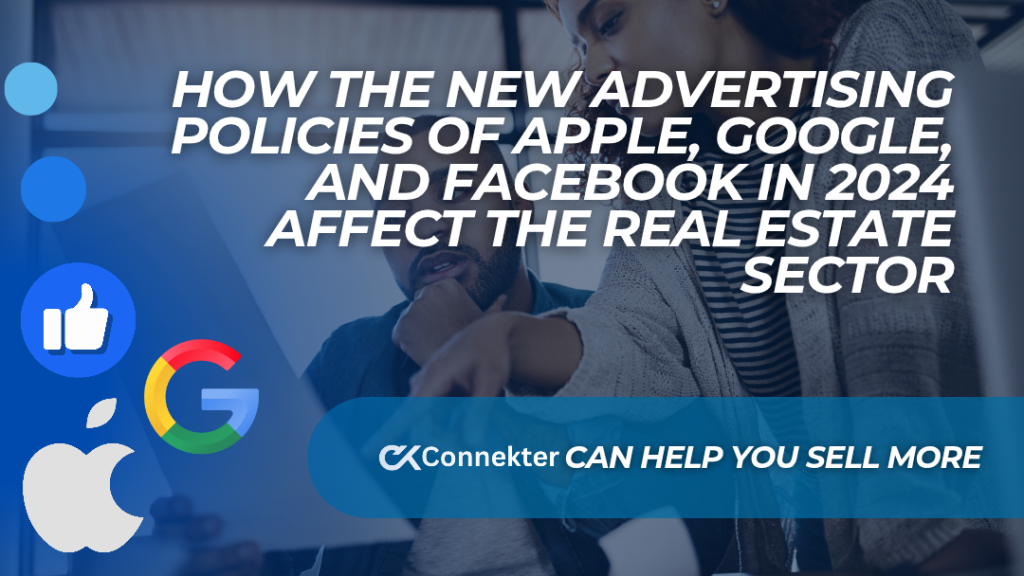
How Connekter Is Revolutionizing Real Estate Marketing Through AI
How closely related is artificial intelligence to the real estate market? Did you know that more than 80% of functions can be performed by AI?
In an era marked by technological advancements occurring at a blistering pace. The real estate industry (commercial, industrial, residential, office, hotel and every other class of real estate) stands on the brink of transformation and the seemingly limitless promise and power of generative artificial intelligence (AI) looms large as both a disruptor and a savior. Just like virtually every other industry, the real estate industry is changing rapidly through the use of AI, and if you aren’t adapting your business to account for those changes, you are putting your business at significant risk.
In today’s fast-paced market, staying ahead means working smarter—not harder. Artificial Intelligence (AI) is no longer a futuristic concept; it’s a practical, everyday tool transforming how real estate professionals operate. From automating routine tasks to predicting client behavior, AI is revolutionizing the game.
The questions on everyone’s mind are: Can AI really predict the future success of a project? How trustworthy is AI? How is AI going to change my business? And What do I need to be worried about?
Brokerage/marketing/investing
AI is already changing the brokerage sector, where AI-powered platforms are introducing new tools which promise to help brokers reshape the way properties are marketed and identified for clients. Beyond mere marketing prowess, AI algorithms also hold the potential to analyze investment criteria, matching investment opportunities, business plans, and risk tolerances, whether for conservative pension funds or risk-tolerant venture capitalists.
Underwriting/due Diligence
The underwriting process, a cornerstone of commercial real estate investment and finance, also stands to benefit immensely from AI integration. By synthesizing multifaceted data points ranging from tenant and income information to environmental risks. AI holds the potential to minimize human error, enhancing the likelihood of sound underwriting and investment decisions. Simultaneously, comprehensive due diligence analysis, imperative for mitigating risks inherent in real estate transactions, can be foreseeably streamlined with AI-driven solutions. By automating reviews of critical documents from rent rolls, leases, and property contracts to title reports, surveys, and environmental reports. AI models will increasingly empower businesses and legal teams to navigate complex transactions with far greater speed and accuracy than ever before.
Regulatory Compliance
For entities subject to regulatory oversight, including REITs, banks and other financial institutions. Compliance is paramount, not to mention the bane of many a real estate professional’s existence. AI offers a potential lifeline to compliance teams, streamlining the arduous task of monitoring and managing the intersection of real estate investment. Also ownership, and operation with governmental and quasi-governmental regulations. By automating compliance procedures, it is possible for AI to not only save time but also ensure adherence to regulatory frameworks, safeguarding against potential legal pitfalls.
Development/management
Real estate developers stand to reap substantial benefits from AI’s integration across the development lifecycle. Platforms are being developed that claim to provide real-time insights on design, cost, and constructability. Empowering developers to optimize project feasibility and accelerate delivery timelines. Similarly, AI’s potential extends beyond transactional phases to property and portfolio management. Where automation promises to streamline tasks ranging from facilities management and collection of rent to financial reporting. By harnessing AI-driven automation, asset managers can look forward to optimized operational efficiency. Also, enhanced tenant experiences, and greater returns on investment.
Transaction Documents and Closings
The documentation phase of real estate transactions and closing of real estate transactions are poised for a seismic shift as large compilations of data are harnessed to train generative AI engines (a frightening thought for some attorneys). By leveraging a company’s historical deal data and written policy positions. It is foreseeable that AI will possess the sophistication. This, to facilitate the drafting and negotiation of transaction documents with precise adherence to given parameters and with unprecedented efficiency and accuracy, and then quickly and efficiently to go through all of the necessary steps to proceed with a closing.
However, companies need to be very careful about the use of historical data, as the ownership and use of such data has been subject to much scrutiny. The use of customer data in a manner that exceeds or otherwise is not permitted by the privacy policy in effect at the time the data was collected could be problematic. As companies think through these issues. Some have (or will) update their Terms of Service (TOS) and/or privacy policy to address this. Before training any AI engines, an attorney should be consulted regarding the use of such data. As there have already been examples of companies spending millions on developing AI tools. This, only to have to unwind them when it has been discovered that the AI engines were trained on data that the companies didn’t own.
As discussed further below, no matter what the newest, shiniest AI platform promises, nothing can, nor should, replace the experience and judgment of seasoned business and legal professionals in reviewing, analyzing, scrutinizing, and correcting the work product of any AI platform.
To summarize these features, here are some AI-powered tools every realtor should be using right now:
1. ChatGPT for Content and Communication
Need quick email drafts, listing descriptions, or social media captions? ChatGPT can help you save time and craft personalized, professional content that connects with your audience.
2. Predictive Analytics Platforms (Like Revaluate or Likely.AI)
These tools analyze massive data sets to predict which leads are most likely to move or sell. That means less time chasing cold leads and more time closing deals.
3. AI-Powered CRMs (Such as Follow Up Boss or Real Geeks)
CRMs with AI capabilities can automatically categorize leads, schedule follow-ups, and even suggest optimal times to reach out—keeping your pipeline organized and active.
4. Virtual Staging & Property Enhancements (e.g., Styldod, BoxBrownie)
AI tools can create high-quality, virtually staged rooms or enhance listing photos, making your properties stand out in a saturated market—without the high costs of traditional staging.
5. Chatbots for 24/7 Engagement (Like Structurely or Drift)
These AI bots can engage with prospects directly on your site or listings, answering questions, scheduling viewings, and capturing contact info even while you sleep.
While the potential benefits of AI in commercial real estate are vast. They are not without accompanying legal and business risks. As business and legal professionals embark on this transformative journey. It’s imperative to tread carefully, mindful of the legal and ethical considerations inherent in AI adoption.
What are These Risks in Real Estate?
One of the foremost concerns surrounding AI adoption is security. With the digitization of sensitive data and the reliance on AI-driven analyses, the risk of data breaches and cyberattacks looms large. As commercial real estate transactions involve vast sums of money and highly confidential information, ensuring robust cybersecurity measures is paramount. Professionals must be fully informed of the terms and conditions of AI platforms they employ, both internally and externally. Moreover, they must invest in and develop secure systems and protocols to safeguard against potential threats. This mitigate the risk of data breaches and inadvertent company information disclosures, and protect client confidentiality. Further, companies need to ensure that they have clear and unambiguous AI policies and procedures in place for their employees.
These policies typically cover employee use of AI, open source issues with AI code generators, responsible development of AI technology and AI models, vendor use of AI in preparing company deliverables and other topics relevant to the company’s involvement with AI. The draw of using public AI tools (like ChatGPT) to accomplish tasks quickly is strong, and employers without strict and clear policies in place with respect to the use of these tools can put their companies and their clients at significant risk.
Accuracy and Reliability of AI-Generated Analyses
Another critical consideration is the accuracy and reliability of AI-generated analyses. While AI platforms hold the promise of streamlining processes and providing valuable insights, their effectiveness is contingent upon the quality of the data they are trained on. Inaccurate or biased data can lead to flawed analyses, potentially resulting in costly errors and misinformed decisions.
This is why it is imperative that companies understand the tools that are being used, how those tools have been developed, what information is being used to train those tools, and what information is being omitted from the training of those tools. As such, all attorneys and business professionals must exercise due diligence in vetting AI platforms and engines and validating their outputs, to ensure that the insights they provide are accurate, reliable, legally sound, and free from bias.
Additionally, the laws and regulations surrounding the use of AI are changing rapidly, and what is in compliance with law today may be prohibited tomorrow.
AI isn’t here to replace realtors—it’s here to elevate them. By integrating these tools into your workflow, you’ll spend less time on busywork and more time building relationships, closing deals, and growing your business. Therefore, if you rely on other tools, the process will be different and more secure. A lead generation platform like Connekter can be a good ally.
Connekter: A Must-Have Platform for Modern Realtors
As artificial intelligence continues to reshape the real estate industry, platforms like Connekter are becoming essential allies for realtors who want to stay ahead of the curve. Designed specifically for real estate professionals, Connekter integrates powerful AI-driven tools that automate content creation, optimize lead conversion, and reduce time spent on administrative tasks.
With features like AI-powered caption generators, smart lead responders, and auto-generated listing descriptions, Connekter enables agents to deliver professional, engaging content with minimal effort. Realtors using Connekter report increased engagement on social media, faster response times to inquiries, and higher conversion rates. Thanks to the intelligent automation that personalizes interactions and enhances their brand visibility.
Whether you’re a solo agent building your presence or a brokerage managing multiple accounts, Connekter gives you the competitive edge needed in a fast-paced, digital-first market. It’s not just a tool—it’s your AI assistant in every step of the marketing journey.
Ready to Work Smarter? Join Connekter Today
The real estate market is moving faster than ever—and so should you. AI isn’t just the future of real estate marketing. It’s already transforming the way top agents attract leads, engage clients, and close deals. With Connekter, you don’t need to be a tech expert to benefit from powerful automation and smart content strategies.
Whether you’re a solo agent looking to stand out, a growing team in need of streamlined systems, or a brokerage ready to scale, Connekter is built to amplify your brand and save you time.
Join hundreds of realtors who are already using Connekter to turn likes into leads and listings into closings.
Your smarter, faster, AI-powered real estate business starts here.
Extra resources:
- Real Estate: Using CRM in Marketing Campaigns with Connekter. Learn more…
- Future Trends in Lead Management Automation: Connekter Features. Read more…
- Lead Generation Best Practices to Boost Sales with Connekter. Read more…
- How I Boosted My Real Estate Business with Connekter. Read more…
- Leveraging Connekter Local US Events Strategy. Learn more here…
- Integrating Cold Calling with Lead Generation Using Connekter. Learn more…

